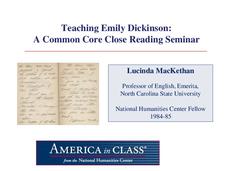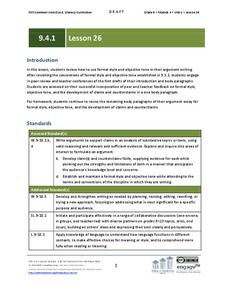California Federation of Chaparral Poets, Inc
Poetic Devices
Have everything you need to know about the elements of poetry with a nine-page handout. Split into four categories—word sounds, meanings, arrangement, and imagery—budding poets may reference terms, read definitions, descriptions, and...
Johnny Mercer Foundation
Project-Based Songwriting
Project-based learning in a music theory class? Take note. Young songwriters compose, record, copyright, and promote their original songs. They even design their own CD cover.
What So Proudly We Hail
A Lesson on Benjamin Franklin’s “Project for Moral Perfection”
Benjamin Franklin identified 13 virtues that he felt would strengthen his character if he could focus on each one. A thorough lesson explores high schoolers' personal values in the context of their lives, and compels them to strive for...
National Humanities Center
Teaching Emily Dickinson: A Common Core Close Reading Seminar
Three of Emily Dickinson's poems, "I like to see it," "Because I could not stop for Death," and "We grow accustomed to the Dark," provide instructors with an opportunity to model for class members how to use close reading strategies to...
Queen's Printer for Ontario
Composers in Music History
What do Johann Sebastian Bach and Miles Davis have in common? Much more than class members might imagine. The comparison of these two famous composers is just one lesson in a unit that investigates many facets of the music industry...
Florida Alliance for Arts Education
Theatre Arts
What skills do storytellers employ to bring to life the characters and events in their tales? After listening to a recording of a Haitian folk tale, class members consider how tone of voice, pace, and gestures can be used to enliven a...
Fluence Learning
Writing About Literature: Nature in the Writings of John Muir and Emily Dickinson
As an assessment of their skill in crafting a compare and contrast essay, class members read and compare the portrayals of nature in excerpts from naturalist John Muir's My First Summer in the Sierra and from poet Emily Dickinson's "The...
Prestwick House
Rhyme and Repetition in Poe's "Annabel Lee"
Many and many a year ago Edgar Allan Poe crafted the chilling tale of "Annabel Lee." The poem is the perfect vehicle to introduce Poe's concept of unity of effect, the idea that every element in a poem or story should help to develop a...
Prestwick House
"Because I could not stop for Death" -- Visualizing Meaning and Tone
Emily Dickinson's "Because I could not stop for Death" provides high schoolers with an opportunity to practice their critical thinking skills. They examine the images, diction, rhythm, and rhyme scheme the poet uses and consider how...
Fluence Learning
Writing About Informational Text: Beyond the Beyond—Galaxies
Everyone has a different point of view, even when it comes to the enormity of the universe. Two separate text passages explain the scope of a galaxy, prompting young readers to write an essay about each author's argument and how the...
Classics for Kids
Introduction to Music: Symphony
Expose young elementary students to the works of one of the greatest musical composers, Ludwig van Beethoven. Using three progressive lesson plans to complete the unit, class members are able to distinguish low and high sounds, count the...
EngageNY
Grade 9 ELA Module 4, Unit 1, Lesson 26
The focus of the day's instructional activity is methods for creating a formal style and objective tone in an argument essay. After examining models, pairs engage in peer review of their essay drafts and continue to revise while...
Scholastic
Choose Your Words Wisely (Grades 9-12)
Words, words, words. The function of words in persuasive writing is the focus of a group activity that asks members to analyze how words advertisers use are designed to influence targeted audiences.
California Education Partners
Vincent Van Gogh
Living in someone's shadow would be difficult for anyone, including one of the most talented artists of the modern age. Middle schoolers read an excerpt from Vincent Van Gogh: Portrait of an Artist by Jan Greenberg and Sandra Jordan...
California Education Partners
The Road Not Taken
An effective lesson plan truly can make all the difference. Seventh graders read, analyze, and annotate Robert Frost's "The Road Not Taken" before writing an essay about what they believe to be the theme of the iconic poem.
National Constitution Center
Born in the U.S.A: Music as Political Protest
Though often used in shows of patriotism, Bruce Springsteen's 1985 song "Born in the U.S.A." is critical of America's role in the Vietnam war and its treatment of American veterans. High schoolers analyze the song's lyrics in an activity...
Freeology
Martin Luther King, Jr.'s "I Have a Dream"
Dr. Martin Luther King, Jr.'s speech "I Have A Dream" is hailed as one of the most eloquent and moving speeches of the 20th century. But what makes his words hit his listeners' ears in just the right ways? Young orators study Dr. King's...
E Reading Worksheets
Tone Worksheet 5
A speaker's attitude toward his or her subject matter determines the tone of a piece of literature. Interpret the tone of four different poems, as well as their meanings, with supporting textual details.
E Reading Worksheets
Tone Worksheet 4
A poet's word choice can be the difference between a poem that is merely sad, and a poem full of heartbreaking regret. Middle schoolers discern the tone in four different poems, noting the relevant textual evidence that supports each...
E Reading Worksheets
Tone Worksheet 3
The interpretation of a poem often lies in the mind of its reader, especially when reading the tone. Focus on author's word choice, middle schoolers read four different poems and briefly state a perceived tone for each, along with the...
E Reading Worksheets
Tone Worksheet 2
The beauty of a poem is lost without an understanding of its tone. Middle schoolers connect author's purpose and word choice to four poems in a literary analysis activity, which prompts them to note each poem's tone and meaning.
E Reading Worksheets
Tone Worksheet 1
Discern the tone in four selected poems with a straightforward assignment. Junior high readers analyze the authors' word choice and text structure to define a tone for each poem, as well as each poem's meaning.
E Reading Worksheets
Tone: Voice of the Speaker
Tone and mood are easy to use interchangeably—and yet they are very different elements of literature. Help middle schoolers discern between the way a speaker feels about his or her subject and the way the audience is meant to feel with a...
Curated OER
8th Grade Reading Comprehension Success
Augment your eighth grade language arts curriculum with a thorough set of reading comprehension activities and assessments. Focusing on a variety of skills, including vocabulary in context, text structure, main idea, and author's style,...

























